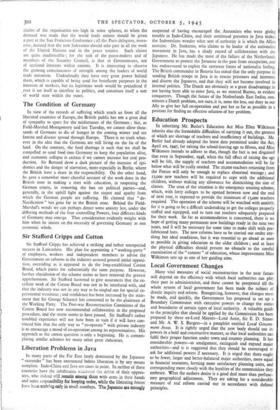Liberation Problems in Java
In many parts of the Far East lately dominated by the Japanese " surrender " has been announced before liberation is by any means complete. Indo-China, and Java are cases in point. In neither of these countries have the inhabitants witnessed the defeat of their oppres- sors, who indeed still remain among them with arms in their hands and some responsibility for keeping order, while the liberating forces have been arriving only in small numbers. The Japanese are strongly
suspected of having encouraged the Annamites who were giving trouble in Indo-China, and their continued presence in Java makes the Indonesians wonder what sort of authority it is which the Allies exercise. Dr. Soekarno, who claims to be leader of the nationalist movement in Java, has a shady record of collaboration with the Japanese. He has made the most of the failure of the Netherlands Government to protect the Javanese in the past from occupation, and has endeavoured to exploit the extremer forms of nationalist feeling. The British commander in Batavia has stated that the only purpose in sending British troops to Java is to rescue prisoners and internees and disarm the Japanese, and that they will not become involved in internal politics. The Dutch are obviously at a great disadvantage in not having been able to enter Java, as we entered Burma, as evident conquerors. Though the future of the Netherlands East Indies con- stitutes a Dutch problem, not ours, it is, none the less, our duty to our Ally to give her full co-operation and put her as far as possible in a position for finding an effective solution of her problem.


























 Previous page
Previous page